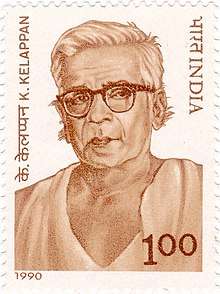K. Kelappan
Koyapalli Kelappan Nair (24 August 1889 – 7 October 1971) was a founding member and president of the Nair Service Society, a reformer, an Indian freedom fighter, educationist and journalist. During Indian independence movement, he was the lead figure of Indian National Congress in Kerala and was popularly known as Kerala Gandhi. After Indian independence, he held various seats in Gandhian organizations.[1]
Kerala Gandhi K. Kelappan | |
|---|---|
 | |
| Born | Koyapalli Kelappan Nair 24 August 1889 |
| Died | 7 October 1971 (aged 82) Calicut, Kerala |
| Nationality | Indian |
| Other names | Koyapalli Kelappan Nair, Kerala Gandhi |
| Education | Graduate |
| Alma mater | University of Madras |
| Occupation | Freedom Fighter, Teacher, Editor and Founder President of Nair Service Society |
| Known for | Indian independence movement |
| Title | Kerala Gandhi |
| Political party | Indian National Congress Kisan Mazdoor Praja Party |
| Spouse(s) | T P Ammalu Amma |
| Children | T P K Kidav |
Early life
Kelappan was born in the small village of Muchukunnu at Koyilandy in Calicut, Kerala.[2]
He studied in Calicut and Madras and graduated from the University of Madras before starting his career as a teacher at St. Berchmans High School, Changanassery. Kelappan was the founding President of the Nair Service Society and later became the principal of a school run by the society.[2]
As reformer
He fought for social reforms on one hand and the British on the other. He fought relentlessly against untouchability and caste-based discrimination.[3] Along with K. Kumar, he became the earliest in Kerala to remove the suffix to his name that implied caste-status.[4] He was called Kerala Gandhi.[2]
Role post independence
After independence he left the Congress Party and joined the Kisan Mazdoor Praja Party and was elected to Parliament from the Ponnani Lok Sabha seat in 1952. At the end of his term, he left active politics and became a Sarvodaya worker and was actively associated with Bhoodan Movement in Kerala.[5]
Kelappan helped in starting Mathrubhoomi and was its editor for a number of years. He worked for unification of Kerala into a new linguistic state. He was also the president of many Gandhian organizations in Kerala including Kerala Sarvodaya Sangh, Kerala Gandhi Smarak Nidhi, Kerala Sarvodaya Mandal and Gandhi Peace Foundation, Calicut.
Some of his political interventions towards the end of his life had been criticized for their communal tinge. These include his opposition to the formation of Muslim-majority Malappuram District in Kerala arguing that it will create a 'mini Pakistan', and his involvement in a temple resurrection near a Mosque in Angadippuram, in Malapppuram leading to communal tensions.[6]
Awards and recognition
In his honour India Post released a Commemorative stamp in 1990.[7]
References
- "K. Kelappan an unsung hero". The Hindu. 1 November 2012. Retrieved 18 January 2017.
- "Freeindia > Biographies > Freedom Fighters > K. Kelappan". Freeindia.org. Sh. Kelappan Centenary State Committee Kerala. Archived from the original on 22 April 2003. Retrieved 1 February 2011.
- K. P. K. Menon (1972). The History of Freedom Movement in Kerala: (1885-1938) / by P.K.K. Menon. Government Press. p. 116.
- K. Kumarji Smaraka Grantham - 1974 - (K. C Pillai)
- "SOME PROMINENT LEADERS OF THE FREEDOM STRUGGLE IN KERALA". Retrieved 26 February 2013.
- Ramji (7 December 1968). Samar Sen (ed.). "A Mini-Pakistan?" (PDF). Frontier Weekly. Calcutta. pp. 8–9.
- K. Kelappan Commemorative Stamp. Indianpost.com. Retrieved on 6 December 2018.